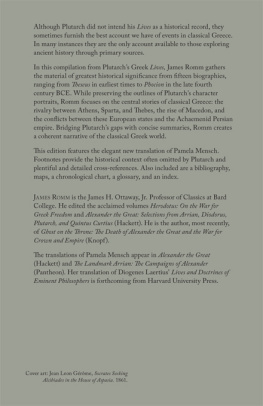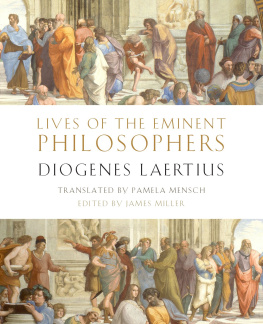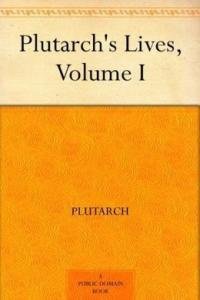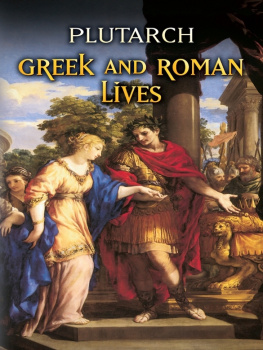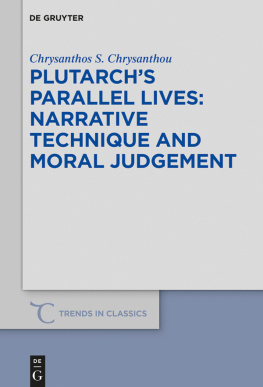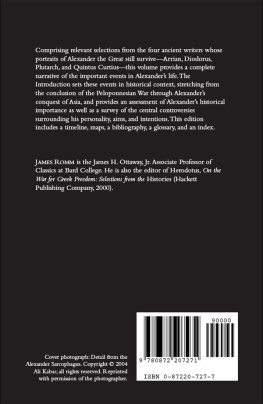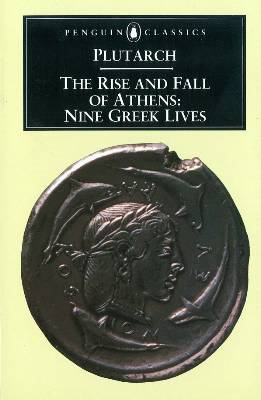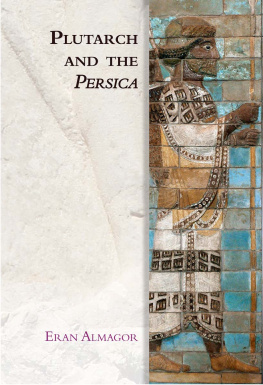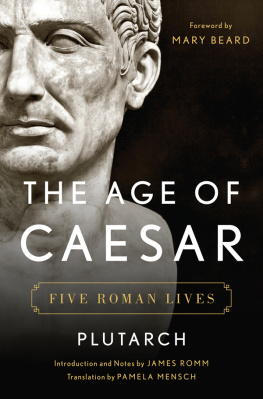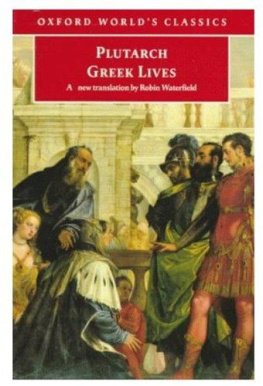PLUTARCH
Lives That Made Greek History
PLUTARCH
Lives That Made Greek History
Edited, with Introductions and Notes, by
James Romm
Translated by Pamela Mensch
Hackett Publishing Company, Inc.
Indianapolis/Cambridge
Copyright 2012 by Hackett Publishing Company, Inc.
All rights reserved
Printed in the United States of America
16 15 14 13 12 1 2 3 4 5 6 7
For further information, please address
Hackett Publishing Company, Inc.
P.O. Box 44937
Indianapolis, Indiana 46244-0937
www.hackettpublishing.com
Cover design by Abigail Coyle
Interior design by Meera Dash
Maps by William Nelson
Composition by William Hartman
Printed at Data Reproductions Corporation
Library of Congress Cataloging-in-Publication Data
Plutarch.
[Lives. English]
Plutarch : lives that made Greek history / edited,
with introductions and notes, by James Romm ; translated
by Pamela Mensch.
p. cm.
Includes bibliographical references and index.
ISBN 978-1-60384-846-6 (pbk.)
ISBN 978-1-60384-847-3 (cloth)
1. GreeceBiography. I. Romm, James S. II. Mensch, Pamela, 1956 III. Title. IV.
Title: Lives that made Greek history.
DE7.P513 2012
938.009'9dc23
2012023888
ePub ISBN: 978-1-60384-961-6
Plutarchs Lives provide a different experience of Greek history than can be found elsewhere. The eras Plutarch dealt with, and even the presentation of important episodes, often overlap closely with the eras covered by the works of Herodotus, Thucydides, and Xenophon, for these were his principal sources. But the questions Plutarch asked differed from those of earlier writers. He tried to show how individual character interacts with society and with history, how ethical qualities either thrive or lead to disaster within the maelstrom of events. He was not concerned with creating a record, for others before him had done that. Six centuries of Greek historical writing stretched out behind him, a treasury in which he delved deep to find the material for his Lives (as well as for the speeches, dialogues, and essays he wrote throughout his life, collected today under the title Moralia).
Plutarch distinguished his character-based approach to history from more traditional narratives in a famous passage at the opening of his Alexander. He vows there to capture the soul of the person he studies as a portrait painter captures the face: the limbs and body are not the portraitists concern, and neither are the mere facts of history Plutarchs. A battle may loom less large in Plutarchs pages than a quip or apothegm in which his subjects spirit stands revealed. Although Plutarch did not ignore any significant action or episodehis readers would be puzzled by such an omissionhe felt free to give short shrift where insight into character could not be gleaned.
In his Parallel Lives of the Greeks and Romans, a work probably dating from the early second century CE, Plutarch created a set of inquiries into how great leaders succeeded or failed; how they held up under stress of political strife and warfare; what moral lessons can be learned from them; and, not least importantly, how the lives of leaders from two different nations, Greece and Rome, echo or resemble one another. In Plutarchs scheme, as the title Parallel Lives indicates, Greek biographies were paired with Roman ones, and most of these pairs were prefaced by a brief essay in which he compared the two figures profiled. In other works written separately, he also produced a handful of unpaired lives, one of which portrayed neither a Greek nor a Roman but a Persian king. Fifty of Plutarchs Lives survive, forty-six of which once belonged to the pairs that made up Parallel Lives. At least twelve additional lives are known to have perished; possibly many more, unknown to us even by title, were lost.
Lost, too, are many of the sources Plutarch used for his research, apart from the three great ones mentioned above. Writers who in his day were considered nearly as great did not survive the broad dying-off of ancient literary works that occurred in the European Dark Ages. As a result, Plutarchs Lives, though not intended as a historical record, sometimes constitute the best record we have or provide a valuable comparison with the records preserved by othersespecially, in the classical Greek context, by Herodotus and Thucydides. In many cases the Lives contain information not found in other sources, the precious relics of Plutarchs readings of Theopompus, Ephorus, Hieronymus of Cardia, and others whose writings have since disappeared.
Plutarch expected his audience to be familiar with the events he deals with, so he sometimes makes only passing references to even the most crucial of these or to important secondary characters. Reading the Lives without the same degree of familiarity is thus often a frustrating endeavor, but this volume is designed to help. In the footnotes I have tried to restore the historical context that Plutarch often leaves out. I have also tried to clarify the sequence of events, about which Plutarch is often vague, since chronology was not his concern. Cross-references to relevant passages in other Lives, or to the works of other authors, help readers to compare available accounts, and bring together information about individuals and episodes into a unified narrative of the classical Greek world.
My interest, as both a teacher and an author, in creating a unified narrative has led me to exclude certain Greek lives from this collection. Theseus was severely truncated on the grounds that, as Plutarch himself acknowledged, it does not have the same grounding in recoverable fact as the lives of other figures. Two works dealing principally with Greek SicilyDion and Timoleonwere omitted altogether, as were those lives that take place largely or entirely in the Hellenistic Age, after the death of Alexander the Great (Eumenes, Pyrrhus, Agis, and Aratus). Also excluded was Artaxerxes, a treatise not originally part of Parallel Lives, dealing with the life and times of a Persian king. I have tried to focus entirely on the central sphere of action in the Classical Age, the region we now call Greece or the Balkan Peninsula, the territory dominated at various times by Athens, Sparta, or Thebes. The fifteen Lives excerpted in this volume center on statesmen from those cities, and, in the case of Alexander, on a Macedonian leader who ineradicably changed the destinies of all three.
A gradual shift in the way the Lives are read, moving away from the ethical and toward the historical, has been under way for some time. Long ago, the elegant pairings Plutarch strove so hard to create were broken up; Greeks were segregated with other Greeks, Romans with Romans. The Penguin Classics series then further broke up the Lives into volumes organized around chronological periodsThe Age of Alexander and the likeencouraging readers to consider them in a primarily historical context. My edition takes a further step in this direction, by excerpting from the Lives the material of greatest historical significance. I have tried to serve the needs of readers exploring ancient history through primary sources, while hopefully also aiding those intrigued by outstanding models of character and behavior.
It has been painful to see some of Plutarchs best anecdotes, apothegms, and moral exempla cast aside in the excerpting process. Yet it is precisely this aspect of his Lives, I believe, that deters many modern readers. Punch lines of Plutarchan jests often today require explanation or cannot be understood at all. Although I have excised many of these, I have tried to retain enough to preserve the basic outlines of Plutarchs character portraits, for these are, above all, what make his
Next page
